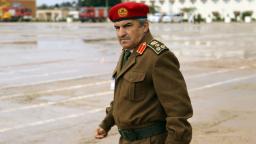[ad_1]

CNN
—
A Libyan armed group claims to have found the barrels of natural uranium that went missing in southern Libya.
A spokesman for the self-styled Libyan National Army (LNA), Khaled Al Mahjoub said on Facebook that the barrels were found 3 miles (5 km) from a warehouse where they were being stored.
A video posted by Mahjoub showed a man wearing a hazmat suit vocally counting 18 blue barrels that allegedly contain the missing natural uranium. The IAEA had said that “10 drums” were missing from the warehouse.
A total of 2.5 tons of natural uranium in the form of uranium ore concentrate were reported missing by the International Atomic Energy Agency [IAEA] this week, after inspectors conducted verification activities Tuesday.
“We are aware of media reports that the material has been found, the Agency is actively working to verify them,” the IAEA said on Thursday. CNN reached out to the IAEA to confirm whether the barrels found by the LNA are the same ones reported missing by the UN nuclear watchdog.
The barrels were stored in a guarded warehouse in southern Libya, but the guards were stationed further away over concerns of radioactivity, Mahjoub said in a post on Facebook.
A barrel-sized hole was found cut open to the side of the storage warehouse, Mahjoub added.
Mahjoub claimed that a Chadian group might have been responsible for stealing the barrels thinking it was arms, but abandoned the barrels after not properly knowing what was inside. The LNA did not provide evidence to support that claim.
The group also said that forces were tasked with guarding the warehouse after an IAEA team visited the warehouse in 2020 and marked the barrels containing uranium.
The IAEA had said that the missing uranium posed “little radiation hazard but it requires safe handling.”
“The loss of knowledge about the present location of nuclear material may present a radiological risk as well as nuclear security concerns,” the IAEA said before the LNA statement.
Libya has had little peace or stability since the 2011 NATO-backed uprising against Moammar Gadhafi. The country split in 2014 between warring factions in the east and west.
[ad_2]
